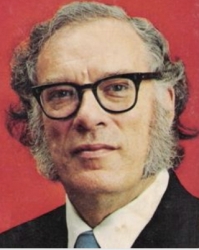  From the time I was about fifteen, I probably read more books by this amazing author than any other writer. Isaac Asimov wrote many science fiction novels, including his most famous one, the original Foundation Trilogy, which was the first science fiction I ever read. Over the years, I reread that Trilogy countless times, along with hundreds of other science fiction authors and thousands of their works.
From the time I was about fifteen, I probably read more books by this amazing author than any other writer. Isaac Asimov wrote many science fiction novels, including his most famous one, the original Foundation Trilogy, which was the first science fiction I ever read. Over the years, I reread that Trilogy countless times, along with hundreds of other science fiction authors and thousands of their works. But Asimov was also a prolific science writer, one who wrote about every science topic imaginable, and many other subjects as well. He loved to explain things. Often, when preparing to write about complex material with which he was not familiar (he was a biochemist), he would research the topic, learning all about the material before attempting to explain it for his readers. I can trace my own love of explaining science and math topics and many other subject areas, as well as my love of teaching, to an early fascination with Asimov and his easy-to-understand writing. Isaac Asimov was a Russian-born American author, a professor of biochemistry, and a highly successful writer, best known for his works of science fiction and for his popular science books. He is generally considered one of the most prolific writers of all time, having written or edited more than 500 books in an incredible variety of subjects. Asimov earned a BSc and MA from Columbia University, and a PhD in chemistry from Columbia in 1948. By 1950, he was a professor at the Boston University School of Medicine. Asimov is widely considered a master of the science-fiction genre and, along with Robert A. Heinlein and Arthur C. Clarke, was considered one of the "Big Three" science-fiction writers during his lifetime. Asimov's most famous work is the Foundation Series, which beat J.R.R. Tolkien's Lord of the Rings to win a 1966 Hugo Award for Best All-Time Series. His other major series are the Galactic Empire series and the Robot series, both of which he later tied into the same fictional universe as the Foundation Series to create a unified "future history" for his stories much like those pioneered by Robert A. Heinlein. He penned numerous short stories, among them "Nightfall", which in 1964 was voted by the Science Fiction Writers of America the best short science fiction story of all time. He also wrote mysteries and fantasy, as well as a great amount of nonfiction. Asimov wrote the Lucky Starr series of juvenile science-fiction novels using the pen name Paul French. Most of Asimov's popularized science books explain scientific concepts in a historical way, going as far back as possible to a time when the science in question was at its simplest stage. He often provides nationalities, birth dates, and death dates for the scientists he mentions, as well as etymologies and pronunciation guides for technical terms. Examples include his Guide to Science, the three volume set Understanding Physics (which I used as a reference in my university classes) , and Asimov's Chronology of Science and Discovery. Asimov was a long-time member and Vice President of Mensa International, as well as president of the American Humanist Association. The asteroid 5020 Asimov, the magazine Asimov's Science Fiction, a Brooklyn NY elementary school, and two different Isaac Asimov Awards are named in his honour. From the 1960s through his death in 1992, Asimov was an iconic celebrity regarded as an authority on both science and science fiction. The author of hundreds of books, he could speak lucidly on virtually any subject, and made frequent TV and radio appearances. Reading Asimovís work, you appreciate his many gifts: his wide-ranging intellect, his amiable writing style, his optimistic spirit, and the breadth of his imagination. Isaac Asimovís Shakespeare book is still used today to stage plays. In February 2018, when Elon Muskís SpaceX launched a Tesla Roadster into space, it included a copy of the books that make up Asimovís Foundation trilogy. In Asimovís science fiction writing, he is most well-known for his Three Laws of Robotics:
In 1958, Asimov switched to mainly writing science books. The following year, he wrote half a million words in eight months, culminating in The Intelligent Manís Guide to Science, nominated for the 1960 National Book Award. Astronomer and science communicator Carl Saganís obituary of Asimov calls him ďone of the great explainers of the ageĒ. A fervent critic of pseudoscience, intolerance and superstition, Asimov spent a good part of his final years championing secular reason in an age when, he believed, the "candle of critical thinking had dimmed". In 1988, he observed: ďthe saddest aspect of life right now is that science gathers knowledge faster than society gathers wisdomĒ. Isaac Asimov died in 1992. A list of his 506 books can be found here. |